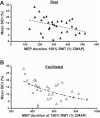Physiological processes influencing motor-evoked potential duration with voluntary contraction
- PMID: 28031404
- PMCID: PMC5340882
- DOI: 10.1152/jn.00832.2016
Physiological processes influencing motor-evoked potential duration with voluntary contraction
Abstract
Voluntary contraction leads to facilitation of motor-evoked potentials (MEPs) producing greater amplitude, shorter onset latency, and prolonged duration of the electromyography potential. Whereas hyperexcitability of spinal motoneurons and changes in descending corticospinal volleys have been proposed as putative mechanisms for changes in MEP amplitude and onset latency, a contribution of propriospinal interneurons, exerting modulatory effects on α-motoneurons, has been proposed as a potential explanation for prolongation of MEP duration. The aim of the present study is to gain further insight into the physiological processes underlying changes in MEP duration. Transcranial magnetic stimulation (TMS) studies were undertaken on 30 healthy controls, using a 90-mm circular coil, with MEPs recorded at rest and during facilitation, produced by contraction of abductor pollicis brevis. In the same experiment, short interval-intracortical inhibition (SICI) was recorded at rest. Facilitation resulted in a significant prolongation of MEP duration, which increased with stimulus intensity and was accompanied by an increase in MEP amplitude. The main effect (TMS intensity × activation state) was correlated with MEP duration (F = 10.9, P < 0.001), whereas TMS intensity (F = 30.5, P < 0.001) and activation state (F = 125.8, P < 0.001) in isolation were correlated with MEP amplitude. There was a significant inverse relationship between SICI and MEP duration at rest (R2 = 0.141, P = 0.041) and during facilitation (R2 = 0.340, P = 0.001). The present findings suggest that similar physiological processes mediate changes in the facilitated MEP duration and amplitude and that both cortical and nonpropriospinal spinal mechanisms contribute to changes in MEP duration.NEW & NOTEWORTHY Muscle contraction is associated with a significant increase in motor-evoked potential (MEP) duration and amplitude. Whereas the increase in MEP duration was linear, the amplitude increase exhibited a ceiling effect. Importantly, the MEP duration increase strongly correlated with short interval-intracortical inhibition, a biomarker of motor cortical function. This suggests that whereas similar physiological processes contribute to changes in facilitated MEP duration and amplitude, cortical mechanisms appear to contribute to MEP duration changes.
Keywords: MEP duration; cortical processes; propriospinal.
Copyright © 2017 the American Physiological Society.
Figures






References
-
- Chen R, Cros D, Curra A, Di Lazzaro V, Lefaucheur JP, Magistris MR, Mills K, Rösler KM, Triggs WJ, Ugawa Y, Ziemann U. The clinical diagnostic utility of transcranial magnetic stimulation: report of an IFCN committee. Clin Neurophysiol 119: 504–532, 2008. doi:10.1016/j.clinph.2007.10.014. - DOI - PubMed
Publication types
MeSH terms
LinkOut - more resources
Full Text Sources
Other Literature Sources

